First Impression: 1997 Triumph T595 Daytona - Motorcycle.com
Triumph's T595 is an extraordinary motorcycle. If you consider the fact it's built by a company that didn't exist 15 years ago, that 10 years ago had no production facilities and five years ago produced less than 5000 bikes, its existence is nothing short of remarkable. Even more remarkable is that the Daytona series' lack of pedigree could justifiably be used to spin out a slew of excuses for faults in the T595, but that's not necessary. Triumph has produced a bike that can sit at the pinnacle of Open Sportbike excellence alongside the 916, Fireblade, YZF and ZXR and kick ass. It is quite simply a miracle in our time. It can't be said that the new generation Triumph Company was built out of the ashes of the company that was once an epitome of post-war British motorcycling.
Those ashes were long cold when in 1984 John Bloor bought the rights to the legendary name and put a small team together to design a modular engine and produce bread-and-butter motorcycles that would kickstart the company back into existence. Six models were presented to the world at the 1990 Cologne show and six months later motorcycle production started. After a cautious couple of years exporting to Europe and Australia, Triumph hit the USA with their '95 season models arriving stateside in October, 1994. After an absence of 20 years, they were back on the radar screens.
The first generation new Triumphs were safe motorcycles, designed and built to show the world that a Brit bike didn't have to shake itself to death, its oily fluids seeping out of every gasketed seal. Styling took a back seat to engineering, and the Trophy, Sprint, Daytona and even the naked Speed Triple models were a tad down on character. These bikes were over-engineered and under-styled, but they served their purpose in getting Triumph back on the map with a reputation for producing good quality -- if slightly bland -- motorcycles.
"Triumph, like a Phoenix, could flex its wings and design a bike to go head-on with the best of the world's Super Sport machines."
One of the first components junked was the old spine frame that had been vital to the modular concept Triumph adopted. A perimeter frame gave designers more freedom to locate the engine for optimum chassis performance. After a couple of exploratory designs in conjunction with Harris, the British frame builders, Triumph adopted a perimeter frame using distinctive oval-section aluminum extrusions. With their mandate to make a strong styling statement, a single-sided rear swingarm has been utilized, providing lots of room to tuck away the oval exhaust can that compliments the cross-section of the frame tubes. Third-party technology has been brought in from Showa for the suspension and Nissin for the brakes.
Current King-of-Stick Bridgestone BT56 Battlax tires are also used as stock equipment. Triumph's original Daytona 900 lump was used as the basis for the T595, but it has lost 26.4 pounds and gained 60cc in the metamorphosis from Jekyl to Hyde. Common consensus is that there is probably another 25 pounds that could be shaved off the T595's mill. With assistance from F1 auto-engineering consultants Lotus, a new top end was designed with bigger valves and new cams contributing to better engine breathing and combustion. Fresh gas is supplied by a Sagem Electronic Fuel Injection (EFI) system, primarily to simplify setting the bike up to meet the wide variety of emission controls from different countries. Its brains are found in the MC2000 Engine Management System that uses sensors sprinkled around the bike to work out the fuel delivery and ignition position, and chokes the engine for you on cold starts. If technology is your bag, you'll find all you need on the T595.
Thank God the technology works. Wheel the bike out of the garage, slip the key in the slot and thumb the starter - nothing happens. Pull the clutch in, try again and the engine fires up instantly, revs holding 2000 for a few seconds before slipping back to a smooth tick-over at 1100 rpm, a unique growl emitting from the three-cylinder powerplant. The engine pulls cleanly with the throttle just cracked open. There's no drive-line snatch at all. Although one of Triumph's goals was to produce a light and compact bike, they have not been entirely successful. With a dry weight of 436 pounds, it's 33 pounds heavier than the CBR900RR, and at slow speeds it feels large -- not heavy, but bulky. The handlebars are clip-ons mounted on the top of the forks and the riding position puts a lot of weight onto the rider's arms. There is something not quite right about the ergonomics, its foot rests being a tad too far forward and the bars both too low and wide. Thankfully, one of the few changes planned for the '98 model is revised handlebar geometry.
"It might look heavy on paper, but the steering is light and neutral."
Riding any bike at street-legal speeds is frustration incarnate. With five percent of the brain active, the other 95 percent has nothing better to do than check the bike for glitches. Freeway speed limits of 75 mph has the Triumph ticking over at 4500 rpm in top gear, and it's here that the only significant problem with its engine appears. Wind the throttle open for a quick decisive passing maneuver, and it hesitates a split-second before pulling cleanly past 5000 rpm. This is the infamous 1000 rpm- wide carburetion hole that becomes so visible when the T595 meets the dyno. The culprit is a restrictive exhaust at this engine speed, a trick used by many manufacturers to meet homologation noise tests. Often this results in slight dips in the power curve around 5000 rpm, but not usually on this scale, as the Triumph sees its torque output drop by 20 percent until the engine pulls through to 7000 rpm.
The bike is completely stable and accurate. Flop it back over to its other side for those lovely, tight Z-bends and the T595 works with you, lining you up wherever you want. Changing lines while cranked over in the corner is no problem, a slight tug on the bars is all that it is needed to move over another 12 inches and cheat Death yet again. The steering is not super-quick like on the new generation GSXR's and the 'Blade, but it inspires absolute confidence.
A conventionally carbureted engine would have a major flat spot in these circumstances, but being less dependent on airflow for fuel metering, the FI system can mask the glitch's side-effects. It's not quite un-noticeable, but damn close. The hot setup to alleviate this is to fit Triumph's after-market race exhaust can. Pull off the freeway, onto your favorite stretch of twisties and blast away into Super Sport heaven.
The bike pulls strongly, with an extra kick as it clears 7000 rpm and growls through to the healthy maximum torque output of 64 lbs/ft.
Gear changes keep the bike pulling like a Saturn 5, giving you another 2000 rpm of some of the highest torque values from any production bike. As the first bend flashes towards you, it's time to check out the Nissin brakes, which are superb, and every fractional change in pressure on the lever has the bike slowing a little faster. The braided steel brake lines eliminates any trace of sponginess. The moment of truth arrives as the bike is tipped into the corner. It might look heavy on paper, but the steering is light and neutral. Pick a line, flip the bike into it and gas it through the corner.
The Bridgestones live up to their reputation for excellent grip and stability. The T595 does need a little work on the suspension, however, to get the best out of the bike. It's adjustable for everything except ride-height on the rear shock. There is not a lot of adjustment on the bump and rebound screws, maybe 5 turns, max. But every half turn makes a noticeable difference, and the bike needs to be softened up both front and rear. With bump and rebound just 1.5 turns off the softest settings, it does a much better job soaking up stutter bumps and ripples without diving significantly under heavy braking. The twisties are a delight, and should you open up enough for some serious speed, the T595 will top out at an indicated 160 mph. It's not the fastest bike in the world, but at that velocity speed is academic. High-speed travel is comfortable, with good protection from the fairing, a little buzz through the handlebars and vibration-free foot rests. There is also a dual-seat option for those wanting to squeeze some poor sod on the back, but that's not what this bike is about.
What is it about? In its sales hype, Triumph names the 'Blade and 916 as being the bikes most heavily influencing the T595's design. But that's not the way it turned out, as the T595 misses the light-weight sharpness of those other bikes. Also, the 916's styling is still unsurpassed. Instead, Triumph has produced a British version of Yamaha's YZF1000R (winner of Motorcycle Online's '97 Open Sportbike Shoot-out). With rumors of the imminent arrival of a cut-down, powered-up version of the YZF for 1998, Triumph may be alone in placing more emphasis on stability than weight, torque than power, acceleration than top speed. Maybe the miracle will be complete and a British bike will once again be the best in the world.
Who would have thought it possible?
Specifications: Manufacturer: TriumphModel: 1997 T595Engine: Liquid-cooled, DOHC 4-stroke, 4-valve triple-cylinderBore x stroke: 79 x 65 mmDisplacement: 955ccCompression Ratio: 11.2:1Carburetion: Sagem Electronic Fuel InjectionTransmission: 6-speedWheelbase: 44.9 in. (1140.5 mm)Seat Height: 33.1 in. (840.7 mm)Fuel Capacity: 4.8 gal. (18 L)Claimed Dry Weight: 435.6 lbs. (197.6 Kg)
More by Colin MacKellar, Dutch Desk



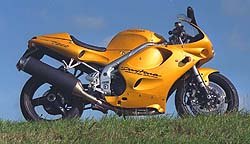











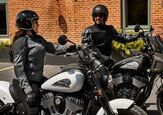
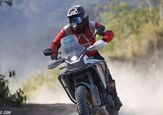
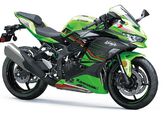
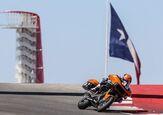

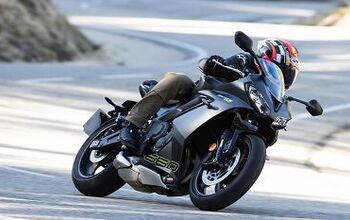

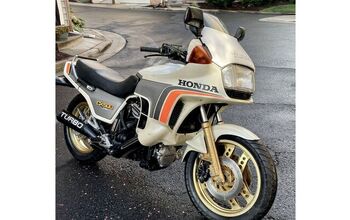
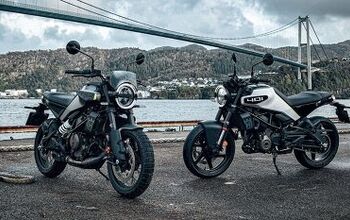

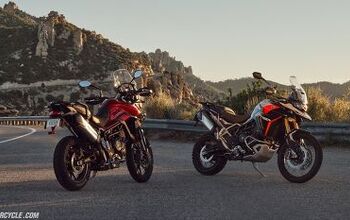
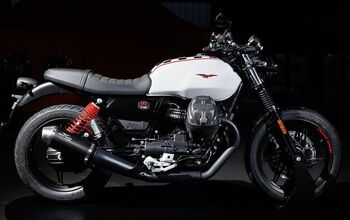
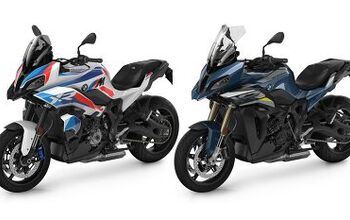
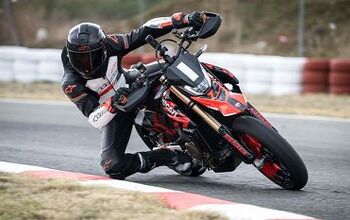
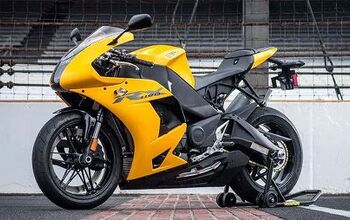
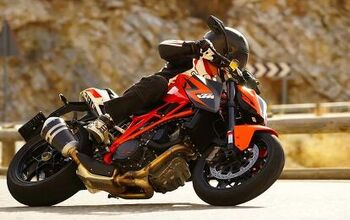
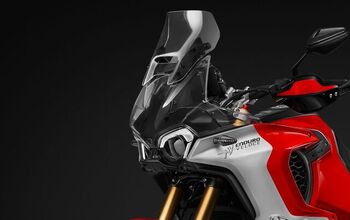
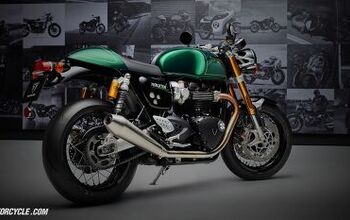
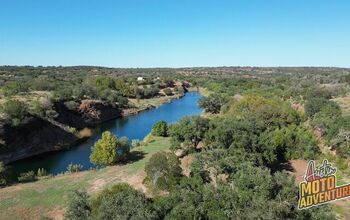
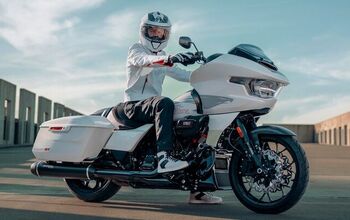
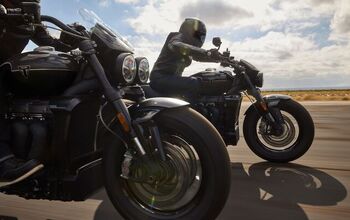

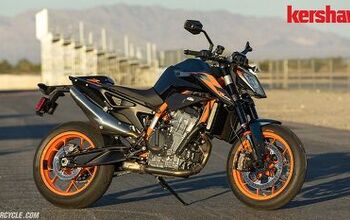
Comments
Join the conversation